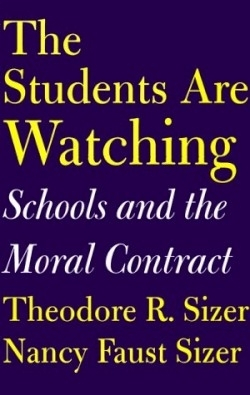
The Students Are Watching
Schools and the Moral Contract
“A middle-class teacher and her working-class student face each other in a large, drafty, grimy high school. The walls had been a bilious green once, before they acquired so many smudges that they took on a dappled look. The stairs are basically sturdy, but broken-off linoleum makes them unsafe. The floors have not been swept thoroughly in a long time. The student says, “You have been to college and stuff. What are you doing in a dump like this?”
With this example, the Sizers propose that our institutions teach students as much as individuals do. If high schools have three tasks: preparing teens for employment; preparing them to use their minds; and preparing them to be useful citizens and decent people, why then, are our educational systems and buildings structured to defeat these expectations?
The Sizers believe that emphasis on testing rather than knowledge combined with large “class size” are the core problems. The authors feel that each student should be individually tracked, much as other large-scale professions do (such as the military). Each student would prepare a portfolio of his or her best work and would have to prepare a written and oral argument on an important topic (similar in structure to a dissertation defense) and present it in front of teachers and a few classmates.
The Sizers acknowledge such a restructuring would be an administrative nightmare, but feel this strategy would challenge students to work to their utmost capacity. They do not indicate if the submitted portfolio should be given a letter grade or a written evaluation. Would a letter grade indicate the individual’s progress or the work itself? For example, Mary has always worked at full capacity and presents an academically rigorous portfolio; she is given an A. Tom began the school year by submitting abysmal work, but has turned in a portfolio showing significant improvement, yet academically, it is far below that of Mary’s submission. Does Tom earn an A for his improvement? Or a lower grade for content? If a written evaluation is used, how then would universities compare evaluation applicants to letter grade submissions?
This book raises provocative questions. Thoughtfully written, it will be of interest to students, teachers, parents or anyone interested in education reform.
Reviewed by
Rebecca Maksel
Disclosure: This article is not an endorsement, but a review. The publisher of this book provided free copies of the book to have their book reviewed by a professional reviewer. No fee was paid by the publisher for this review. Foreword Reviews only recommends books that we love. Foreword Magazine, Inc. is disclosing this in accordance with the Federal Trade Commission’s 16 CFR, Part 255.
